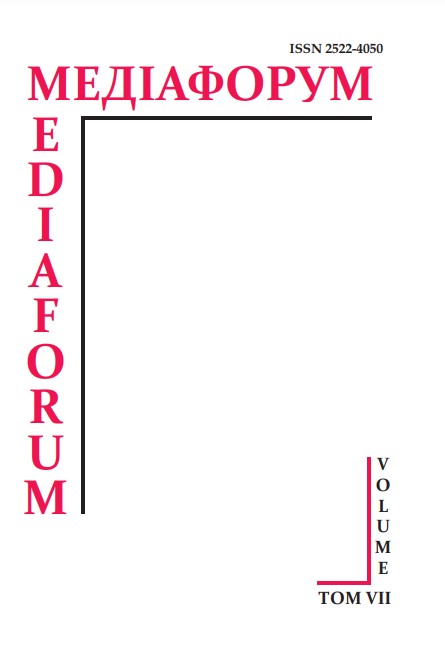The Role of Cinema in the History of Media Education in Canada
DOI:
https://doi.org/10.31861/mediaforum.2019.7.221-234Keywords:
media education, media educators, media culture, cinema, cinema education, screen education, screen influence, information technology, research, education, e-learning, CanadaAbstract
The era of audiovisual culture began more than a hundred years ago with the advent of cinema, and is associated with a special language that underlies non-verbal communication processes. Today, screen influence on humans is dominant, as the generation for which computer is an integral part of everyday life has grown. In recent years, non-verbal language around the world has been a major tool in the fight for influence over human consciousness and intelligence. Formation of basic concepts of media education, which later developed into an international pedagogical movement, in a number of western countries (Great Britain, France, Germany) began in the 60’s and 70’s of the XX century. In Canada, as in most highly developed countries (USA, UK, France, Australia), the history of media education began to emerge from cinematographic material. The concept of screen education was formed by the British Society for Education in Film (SEFT), initiated by a group of enthusiastic educators in 1950. In the second half of the twentieth century, due to the intensive development of television, the initial term “film teaching” was
transformed into “screen education”. The high intensity of students’ contact with new audiovisual media has become a subject of pedagogical excitement.
There was a problem adjusting your children’s audience and media. The most progressive Canadian educators, who have recognized the futility of trying to differentiate students from the growing impact of TV and cinema, have begun introducing a special course in Screen Arts. The use of teachers of the rich potential of new audiovisual media has greatly optimized the learning process itself, the use of films in the classroom has become increasingly motivated.
At the end of 1968, an assistant position was created at the Ontario Department of Education, which coordinated work in the “onscreen education” field. It is worth noting that media education in Canada developed under the influence of English media pedagogy. The first developments in the study of “screen education” were proposed in 1968 by British Professor A. Hodgkinson. Canadian institutions are actively implementing media education programs, as the development of e-learning is linked to the hope of solving a number of socio-economic problems. In particular, raising the general education level of the population, expanding access to higher levels of education, meeting the needs for higher education, organizing regular training of specialists in various fields. After all, on the way of building an e-learning system, countries need to solve a set of complex technological problems to ensure the functioning of an extensive network of training centers, quality control of the educational process, training of teaching staff and other problems.
Today, it is safe to say that Canada’s media education is on the rise and occupies a leading position in the world. Thus, at the beginning of the 21st century, Canada’s media education reached a level of mass development, based on serious theoretical and methodological developments. Moreover, Canada remains the world leader in higher education and spends at least $ 25 billion on its universities annually. Only the United States, the United Kingdom and Australia are the biggest competitors in this area.
Downloads
References
Kyrylova, N.B. 2005. «Medyakultura: ot moderna k postmodernu» (Media culture: from modern to postmodern), Moskva: Akademycheskyi Proekt
Kolesnychenko, V.L. 2007. «Osnovnye tendencii razvitiya mediaobrazovaniya v Kanade 50-80 gg ХХ veka» (The main trends in the development of media education in Canada of the 50s-80s of the twentieth century) VRL:https://cyberleninka.ru/article/n/osnovnye-tendentsiirazvitiya-mediaobrazovaniya-v-kanade-50-h-80-h-godov-хх veka
Kontseptsiia vprovadzhennia mediaosvity v Ukraini 2016. (Concept of introduction of media education in Ukraine) ttps://ms.detector.media/mediaprosvita/mediaosvita/kontseptsiya_vprovadzhennya_mediaosviti_v_ukraini_nova_redaktsiya
Maklyuen, G.M. 2003. «Ponimanie media: vneshnee rasshirenie cheloveka» (Understanding Media: the Extensions of Man) http://yanko.lib.ru/books/media/mcluhan-understanding_media.pdf
Makukh-Fedorkova, I.I. 2011. «Kanadska model vprovadzhennia mediaosvity v konteksti suchasnoi osvitnoi polityky» (The Canadian model of media education implementation in the context of contemporary education policy), Chernivtsi: Chernivtsi National University
Makukh-Fedorkova, I.I. 2007. «Osoblyvosti formuvannia innovatsiinoho suspilstva v Kanadi» (Features of formation of innovative society in Canada), Chernivtsi: Ruta
Fedorov, A.V., Novikova, A.A., Kolisnichenko, V.L. Karuna, I.A. 2007. «Mediaobrazovanie v SShA, Kanade i Velikobritanii» (Media Education in the USA, Canada and the UK) http://window.edu.ru/catalog/pdf2 txt/620/36620/13555?pt?p_pagе=15
Fedorov, A.V. 2002 «Mediaobrazovanie v Kanade» (Media Education in Canada) http:// cyberleninka.ru/article/n/mediaobrazovaniev-kanade
Sharikov, A.V. 1988 «Problema izucheniya sredstv massovoj informacii v shkolah Zapada» (The problem of studying the media in Western schools), Sovetskaya pedagogika (Soviet pedagogy): 5. 125-130.
Andersen N., Dunsan B., Pungente J. 1993. Media Education in Canada The Second Spring. In : Aufderheide P., Firestone C. Media Literacy: A Report of the National Leadership Conference on Media Literacy. Queenstown
Katz J. 1970. An Integrated Approach to the Teaching of Film and Literature https://academic.oup.com/screen/article-abstract/11/4-5/56/1608204?redirectedFrom=fulltext
Moore G.J. 1969. The Case for Screen Education. In: Stewart, F.K. and Nuttal J. Screen Education in Canadian School. Toronto: Canadian Education Association
The second spring: media literacy in Canada’s schools http://jcp.proscenia.net/publications/articles_mlr/pungente/secondspring.html
Worsnop C. 1994. Screening Images: Ideas for Media Education Mississauga














